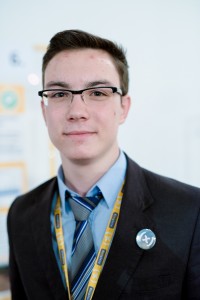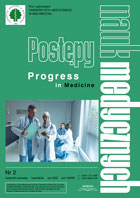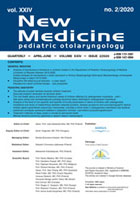Polish high school student develops technology for lab grown organs
A wrist band measuring the heart rate and body temperature, a piece of automated training equipment helping patients in long rehabilitation to learn how to walk again, or Pregnabit, a device for remote basic diagnostics in the last trimester of pregnancy. These are but a few innovations to be presented at the Investing in Medical Innovations Congress & Fair (Katowice, 18-19 February).
Among the authors of the innovations to take stage at the congress is Maciej Mańka, a student at the Junior and Senior High School in Chorzów (Akademicki Zespół Szkół Ogólnokształcących). He is the youngest of all speakers. He will present his own-developed technology for manufacturing devices for growing artificial organs.
Maciej Mańka pursues his scientific passions under the eye of Joanna Raczkowska, PhD and Jakub Rysz, PhD at Faculty of Physics and Astronomy, Jagiellonian University. “The result of my research is the Poland’s first and one of Europe’s unique prototype of a device which is identical to the one developed at Harvard. However, I made out a technology for much cheaper and less sophisticated production process, which otherwise involves the use of equipment that most universities don’t have access to,” says Maciej Mańka.
New possibilities to test medication
Maciej Mańka believes that the technology he’s working on may enable precise analysis of the adverse effects that even the smallest bacteria and viruses can have on the human body. What’s more, it could also allow us to test new medicines in entirely new conditions. “An increasing number of cutting-edge therapies, such as anti-cancer or AIDS treatments, involves particles that are so small that it becomes difficult to study them on animals. This technology does away with the problem of complicated animal testing, and opens the way for tests on human rather than mice cells,” explains the talented student.
It all started with a scientific internship programme by E(x)plory
The cooperation between Maciej Mańka and the Jagiellonian University kicked off in 2015, when the young citizen of Chorzów made his way to the finals of the science competition E(x)plory, and then won an internship programme at the university. Will Maciej’s delivery at Investing in Medical Innovations earn him a deal with an investor?
Magdalena Władysiuk, President at MedInvest Scanner, a company which is capable of assessing if any new medical technology development holds a potential to bring actual improvement to the lives of patients and welfare system, explains: “For the authors of these innovations, the Congress is a good occasion to get some insight into the process leading form a technological idea to its commercialisation. We’ll be speaking about key considerations in budget planning, certification and patenting.
The Congress will bring together authors of innovative projects
Speaking at the Congress will be some authors of innovative projects from across Poland, including Edyta Kocyk, a doctoral student at SGH, who designed a wrist band measuring such indicators as the heart rate or body temperature, Bartłomiej Wielogórski and Grzegorz Piątek, graduates from AGH, who invented an automated device assisting persons undergoing long rehabilitation in learning to walk again after an injury, or Patrycja Wizińska-Socha, Anna Skotny and Marcin Bruś, authors of Pregnabit, a device for remote diagnostics with standard tests in the final trimester of pregnancy.
For more information about the congress, visit http://congress.medinvestscanner.com/.
















